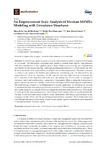Mostrar o rexistro simple do ítem
An Empowerment Scale Analysis of Mexican MSMEs: Modeling with Covariance Structures
| dc.contributor.author | Del Río-Rama, María de la Cruz | |
| dc.contributor.author | Ríos, Martha | |
| dc.contributor.author | Álvarez-García, José | |
| dc.contributor.author | Sánchez-Fernández, María Dolores | |
| dc.date.accessioned | 2020-11-09T12:04:16Z | |
| dc.date.available | 2020-11-09T12:04:16Z | |
| dc.date.issued | 2020 | |
| dc.identifier.citation | del Río-Rama, M.C.; Ríos-Manríquez, M.; Álvarez-García, J.; Sánchez-Fernández, M.D. An Empowerment Scale Analysis of Mexican MSMEs: Modeling with Covariance Structures. Mathematics 2020, 8, 1817. Doi: 10.3390/math8101817 | es_ES |
| dc.identifier.issn | 2227-7390 | |
| dc.identifier.uri | http://hdl.handle.net/2183/26661 | |
| dc.description.abstract | [Abstract] Trained human capital is a source of incalculable resources, with an impact on the results of companies. For this reason, companies must carefully consider three aspects: empowerment with the consideration of the cognitive state of their collaborators; training and compensation; and fluidity in information sharing. Although granting empowerment to collaborators has been shown to be beneficial for organizations, its adoption has not been popularized. Therefore, it remains a construct that needs to be studied and understood, considering that it is influenced by the organizational culture of companies. In this research, the main objective was to examine the factor structure of the empowerment scale from the perspective of the owner or manager of the micro, small and medium-sized companies of Guanajuato, Mexico; using the dimensions of psychological empowerment; fluidity in information sharing; as well as training and compensation. The methodology is based on the Mathematical Economy; application of mathematical methods to represent theories and analyze problems in economics. This investigation used an exploratory and confirmatory factor analysis (CFA) to validate the proposed measurement scale. The sample is made up of 222 valid questionnaires. The CFA provided evidence that the model that best fits the data is a second-order model made up of two dimensions: self-efficacy and influence on the company’s results, which carry the psychological empowerment construct. These results make clear that although information is necessary to train human capital, cognitive variables are more important in the empowerment of human capital | es_ES |
| dc.language.iso | eng | es_ES |
| dc.publisher | MDPI AG | es_ES |
| dc.relation.uri | https://doi.org/10.3390/math8101817 | es_ES |
| dc.rights | Atribución-NoComercial-SinDerivadas 4.0 Internacional | es_ES |
| dc.rights.uri | http://creativecommons.org/licenses/by-nc-nd/4.0/ | * |
| dc.subject | Empowerment scale | es_ES |
| dc.subject | Confirmatory factor analysis | es_ES |
| dc.subject | México | es_ES |
| dc.title | An Empowerment Scale Analysis of Mexican MSMEs: Modeling with Covariance Structures | es_ES |
| dc.type | info:eu-repo/semantics/article | es_ES |
| dc.rights.access | info:eu-repo/semantics/openAccess | es_ES |
| UDC.journalTitle | Mathematics | es_ES |
| UDC.volume | 8 | es_ES |
| UDC.issue | 10 | es_ES |
| UDC.startPage | 1 | es_ES |
| UDC.endPage | 23 | es_ES |
Ficheiros no ítem
Este ítem aparece na(s) seguinte(s) colección(s)
-
GI-GREFIN - Artigos [70]






